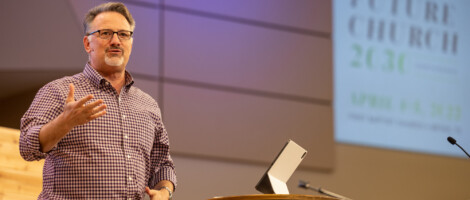Tod Bolsinger speaks on leading through adaptive challenges at Future Church 2030 Conference
by Bonnie Shaw on April 6, 2022 in News

“We weren’t trained for this, we weren’t raised for this, we weren’t prepared for this… we thought this was a boat trip, and now we’re facing mountains,” Tod Bolsinger, co-founder and principal at AE Sloan Leadership, said on Monday night of the Future Church 2030 Conference.
During his presentation, entitled “How Not to Waste a Crisis,” Bolsinger drew heavily from the story of the explorers Meriweather Lewis and William Clark, who set out to explore the Louisiana Purchase and search for the Northwest Passage. During their journey, they canoed up the Missouri River until they encountered the Rocky Mountains. Because of these mountains, their canoes were now useless, and Lewis and Clark had to completely change their traveling methods. Furthermore, the mountains were completely different from any mountains they had ever faced before.
“They were discovering that the world in front of them was nothing like the world behind them. And they were experts at the world behind them,” Bolsinger said.
Many churches are in a similar position to Lewis and Clark, Bolsinger explained, where the things that they have been doing for years are now not working. The last few years have been a time of crisis, whether it was COVID-19, increased divisiveness or new wars, and it has caused many of the old methods of leading and growing a church to become ineffective, leading to setbacks in many churches.
There are two phases of leading in a crisis, he said. The first is the acute phase, where you act quickly to stabilize and protect your church to buy time. The second phase is the adaptive phase, where you must address the underlying issues so that your church can not only live on but thrive. Many of these underlying conditions, Bolsinger said, may have been in your church for years, but you have not had to confront them before. Now, in a time of challenge, those problems may be magnified, and it is essential to address them.
During some of the webinars he held during the pandemic, Bolsinger saw that some of the problems churches mentioned included a lack of deep discipleship, lack of community for keeping relational connections, lack of cross-generational engagement, lack of extensive leadership capacity or lack of prophetic wisdom for addressing challenges for social justice.
These adaptive challenges, Bolsinger continued to say, cannot be solved with existing knowledge, rather, they require a shift in values, expectations or behavior. Like Lewis and Clark, you have to know how to adapt to meet these unknowns.
“What are you going to do with the fact that the world in front of you is nothing like the world behind you?” Bolsinger asked the church leaders in attendance.
Being learning leaders is essential to navigating these adaptive challenges. Leaders of the future lead the learning process with vulnerability and self-awareness, Bolsinger said.
During this time of learning and change, it is imperative to keep the “core DNA” of your church or ministry the same. Before change can come, you have to know what needs to be kept consistent and steady.
“It’s about being the healthiest version of ourselves, which means we have to get really really clear about our core values,” Bolsinger said. “And by that, I don’t mean our aspirational values. Not who we should be, but who we are. [We need to be] the healthiest version of that.”
He shared a quote from Jim Collins, which said, “Once you have determined what will never change, you must then be prepared to change everything else.”
As churches learn and try new things, Bolsinger encouraged them that, as long as they are learning from their mistakes, there is no true failure. Not everything they try will be a success, but it will all help the church grow. No matter what criticism or hardship may come from a time of adaptive challenges and change, Bolsinger encouraged churches to remember that the Lord is on their side.
“When we’re trying to lead change in a world where nothing is like it was behind us, we’re going to have to learn, we’re going to have to leave things behind, and we’re going to have to lead people… when it gets really bad, remember, [God says] you are my beloved child, chosen and marked for this. And you were loved into existence,” he said.
Texas Baptists is a movement of God’s people to share Christ and show love by strengthening churches and ministers, engaging culture and connecting the nations to Jesus.
The ministry of the convention is made possible by giving through the Texas Baptists Cooperative Program, Mary Hill Davis Offering® for Texas Missions, Texas Baptists Worldwide and Texas Baptist Missions Foundation. Thank you for your faithful and generous support.
Subscribe to receive stories like this one directly to your inbox.
We are more together.
Read more articles in: News, Church Health
More from Bonnie Shaw
- 2022 Annual Meeting celebrates unwavering commitment to sharing Christ and showing love
- 2022 Missions Banquet looks towards sharing the gospel with ‘every nation, tribe and language’
- Texas Baptists messengers elect new officers, raise budget for second consecutive year
- Pastor’s Common Rally provides space for collaboration, fellowship for young ministry leaders
- Equipping believers to defend their faith in the Philippines and in Texas